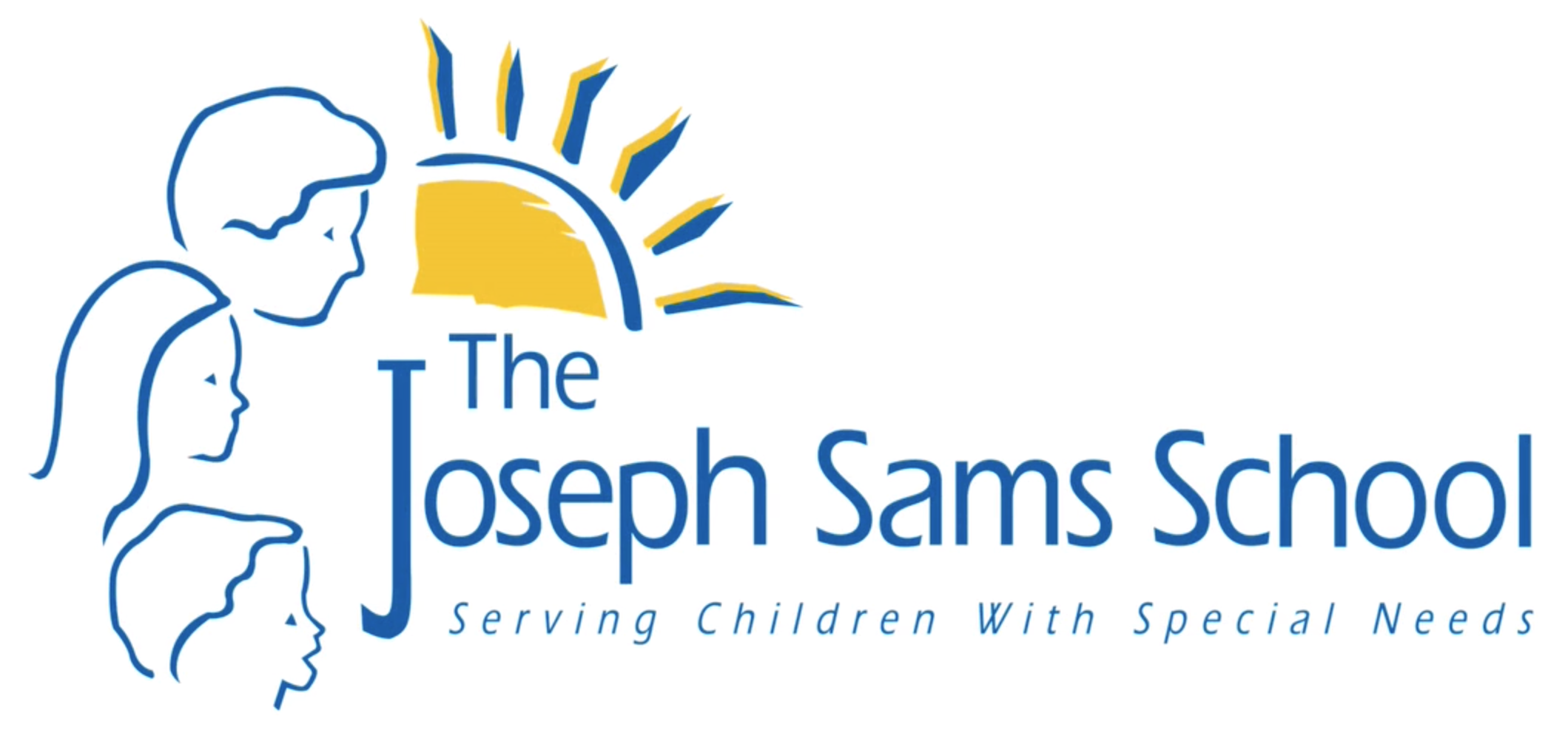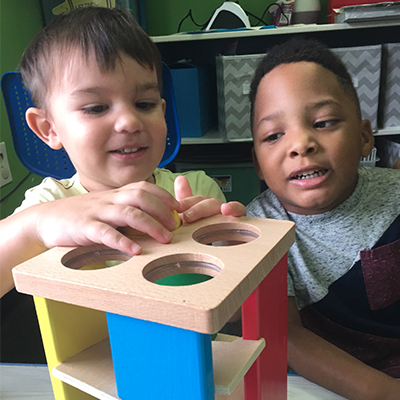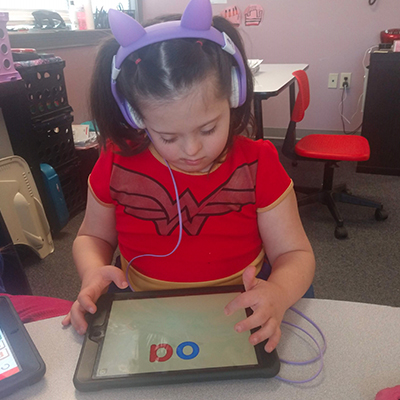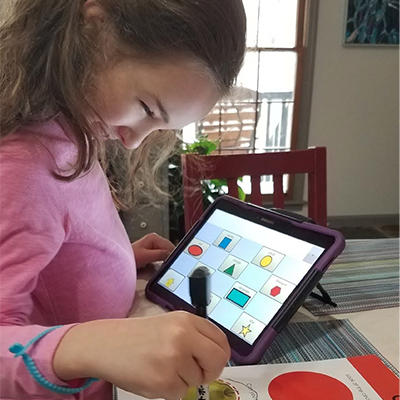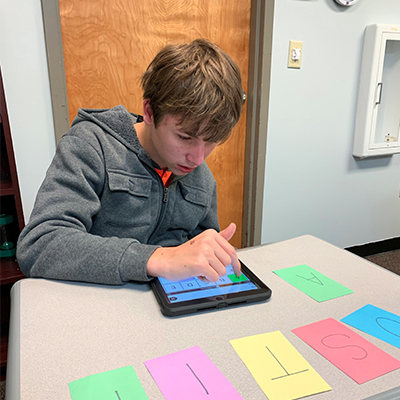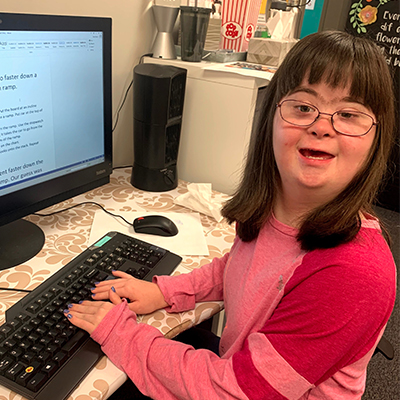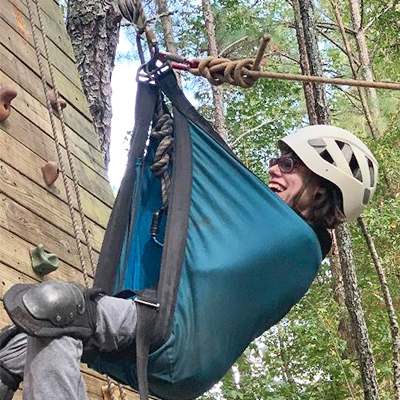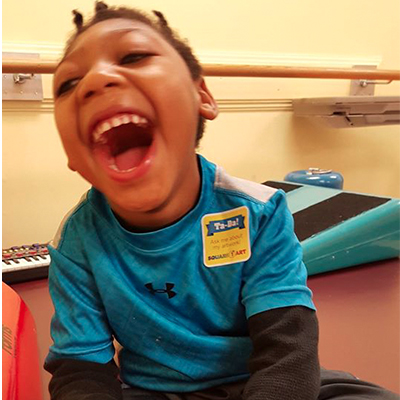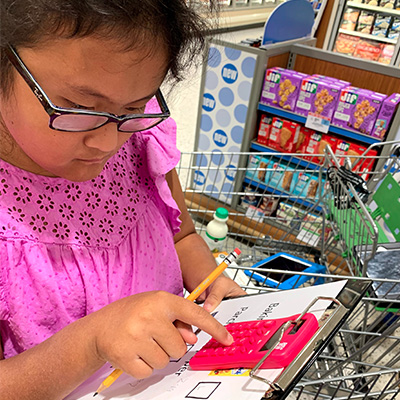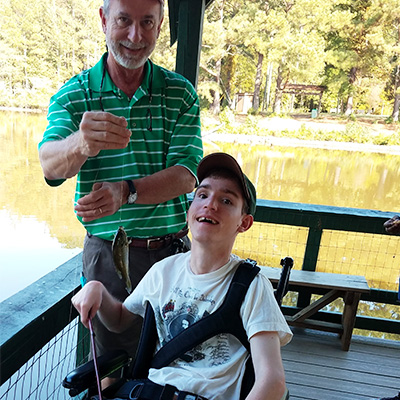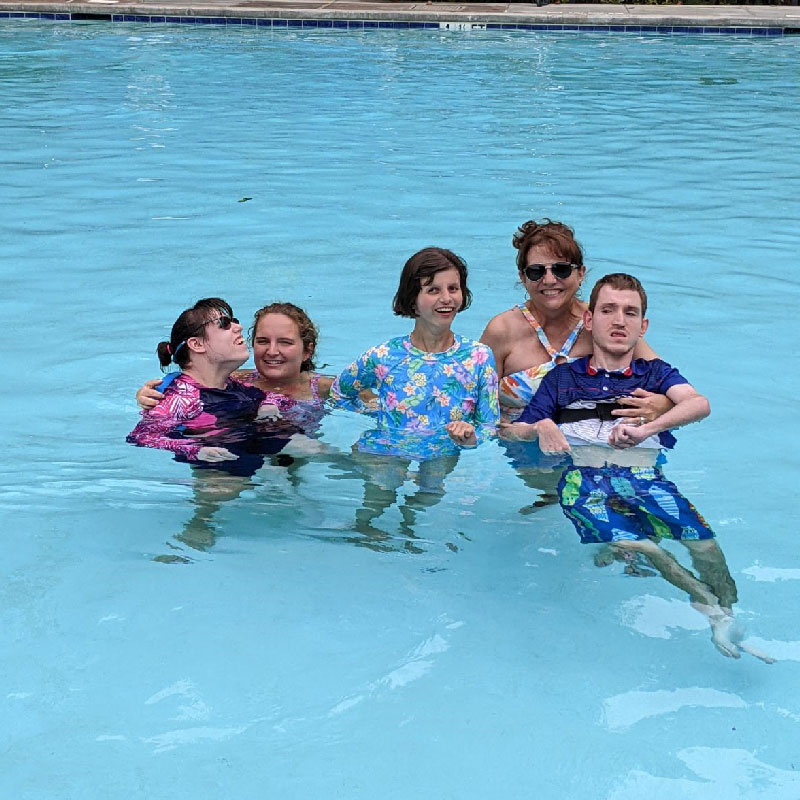Welcome to The Joseph Sams School
Not only are we serving children with disabilities, the school also provides consultative services to programs developing similar intervention strategies for young children throughout the state. The Joseph Sams School staff also works closely with private therapists and physicians to provide comprehensive programs for its students. We also offer one-on-one tutoring to children with disabilities. Such joint efforts have proven to be successful for these children’s development.
THE JOSEPH SAMS SCHOOL IS LOCATED IN FAYETTEVILLE, GEORGIA, AND CURRENTLY SERVES CHILDREN FROM SEVERAL GEORGIA COUNTIES.
We can’t wait to meet your family! See a list of our programs below.
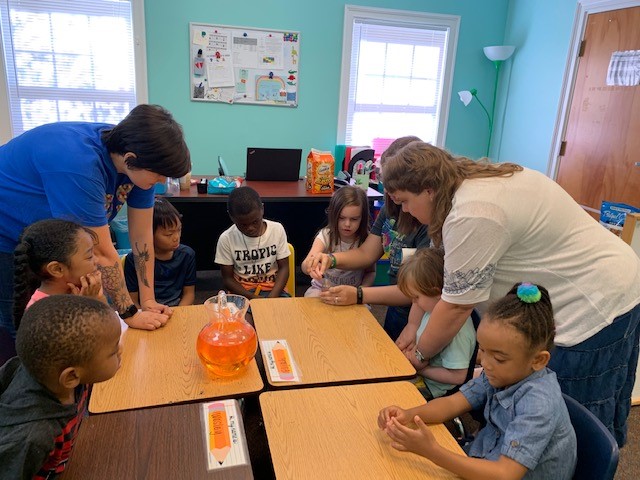
Educational Programs
Support Programs
Adult Day Program
Early Intervention
The Early Intervention Program provides part-day special education instruction and therapies for children from birth through four years of age with infant stimulation and preschool sessions.
Infant and Toddler Stimulation Program (2-10 hours weekly):
- The Infant and Toddler Stimulation Program is a “center-based” program serving children from birth to approximately 24 months of age.
- Children have Individual Program Plans (IPP).
- Children receive assistance in the areas of gross motor, fine motor, communication, cognition, and self-help skills.
- Parents and/or guardians may attend sessions to learn activities to carry over into the home environment, enabling them to become active participants in their child’s education from the beginning.
The Preschool Program (4 hours daily, 5 hours daily):
- The Preschool Program serves children from approximately 24 months through 4 years of age.
- Children have an Individual Educational Plan (IEP).
- 2:1 and/or 3:1 student to teacher ratios are maintained in the Preschool Program with placement dependent upon the support the child needs to be successful in the classroom setting and to achieve measurable gains in development.
- Children work in the areas of cognition, gross motor, fine motor, speech/language/communication, and social/self-help skills.
- Children receive weekly individual speech and language therapy sessions.
- Music therapy and therapeutic art are incorporated in the Preschool Program. Students enjoy and benefit from music therapy as well as explore the world of art through therapeutic art sessions.
- The Unique Learning System curriculum is utilized in classes.
- Speech/language/communication instruction is embedded into each child’s activities throughout the day giving children the opportunity to utilize their communication skills within the natural classroom setting.
- If appropriate, children are included in the MOVE (Mobility Opportunity via Education) Program which teaches functional mobility skills.
Primary School
The Primary Program offers full-day special education classes for children from 5-7 years of age with an emphasis on academics, functional academics, and life skills training.
Primary School Program (6.5 hours daily):
- All students have an Individual Educational Plan (IEP).
- 3:1 student to teacher ratios are maintained in the Primary Program with placement dependent upon the support the child needs to be successful in the classroom setting and to achieve measurable gains in development.
- Children are provided the opportunity to develop and refine skills in the following areas: reading, language arts, math, communication, science, social studies, gross and fine motor, as well social/self-help skills.
- Children receive weekly individual speech and language therapy sessions.
- Speech/language/communication instruction is embedded into each child’s activities throughout the day giving children the opportunity to utilize their communication skills within the natural classroom setting.
- The Unique Learning System curriculum is utilized in all classes.
- Music therapy and therapeutic art are incorporated in the Primary Program. Students enjoy and benefit from music therapy as well as explore the world of art through therapeutic art sessions.
- If appropriate, children are included in the MOVE (Mobility Opportunity via Education) Program which teaches functional mobility skills.
Elementary Program
The Elementary Program offers full-day special education classes for children from 8-12 years of age with an emphasis on functional academics, community-based instruction, and life skills training.
Elementary School (6.5 hours daily):
- 3:1 student to teacher ratios are maintained in the elementary classrooms.
- A student’s placement is dependent upon the level of support the child needs to be successful and achieve measurable gains within the classroom and community settings.
- Students have an Individual Educational Plan (IEP).
- Students receive weekly individual or small group speech and language therapy sessions depending upon the individual needs of the child and based upon the recommendation of the instructional and support staff.
- Speech/language/communication instruction is embedded into each student’s activities throughout the day, thereby, providing multiple opportunities to utilize communication skills within the natural classroom setting as well as in community venues to promote communication across all environments.
- The Unique Learning System curriculum is utilized in all classes.
- Music and art therapies are incorporated in the Elementary Program. Students enjoy and benefit from music therapy as well as explore the world of art through therapeutic art sessions.
- If appropriate, children are included in the MOVE (Mobility Opportunity via Education) Program which teaches
Upper School
The Upper School Program offers full-day special education classes for children from 13-22 years of age with an emphasis on functional academics, community-based instruction, as well as vocational and life skills training.
Upper School Program (6.5 hours daily):
- 3:1 and 2:1 student to teacher ratios are maintained in the Upper School classrooms. A student’s placement is dependent upon the level of support the child needs to be successful and achieve measurable gains within the classroom and community settings.
- Students have an Individual Educational Plan (IEP).
- Students receive weekly individual or small group speech and language therapy sessions depending upon the individual needs of the child and upon the recommendation of the instructional and support staff.
- Speech/language/communication instruction is embedded into each student’s activities throughout the day, thereby, providing multiple opportunities to utilize communication skills within the natural classroom setting as well as in community venues to promote communication across all environments.
- The Unique Learning System curriculum is utilized in all classes.
- Music therapy and therapeutic art classes are incorporated in the Upper School Program. Students enjoy and benefit from music therapy as well as explore the world of art through therapeutic art sessions.
- If appropriate, students are included in the MOVE (Mobility Opportunity via Education) Program which teaches functional mobility skills.
ATLAS Program
ATLAS (Adult Transitional Living and Support) Program: ATLAS is a transition program serving 18-22 year olds with its purpose of ensuring that students have the essential skills and community connections to successfully transition, work, and live as contributing adults in their respective communities.
ATLAS Program (6.5 hours daily):
- A student’s placement is dependent upon the level of support the child needs to be successful and achieve measurable gains within the classroom and community settings.
- Students have an Individual Educational Plan (IEP).
- Students receive weekly individual or small group speech and language therapy sessions depending upon the individual needs of the child based and upon the recommendation of the instructional and support staff.
- Speech/language/communication instruction is embedded into each student’s activities throughout the day, thereby, providing multiple opportunities to utilize communication skills within the natural classroom setting as well as in community venues to promote communication across all environments.
- The Unique Learning System curriculum is utilized in all classes.
- Music therapy and therapeutic art classes are incorporated in the Upper School Program. Students enjoy and benefit from music therapy as well as explore the world of art through therapeutic art sessions.
- If appropriate, students are included in the MOVE (Mobility Opportunity via Education) Program which teaches functional mobility skills.
Collaborative Program
The Collaborative Program provides a small intensive educational environment utilizing a modified Applied Behavioral Analysis (ABA) approach to teaching.
Collaborative Program (5-6.5 hours daily):
- The Collaborative Program provides a 3-tiered intensive instructional classroom program utilizing a modified Applied Behavioral Analysis (ABA) approach to instruction.
- ABA is a comprehensive and effective approach for teaching children. Based upon the principles of behaviorism, ABA involves the breakdown of skills into small, discrete tasks taught in a highly structured and hierarchical manner with instructors trained to systemically reinforce desired behaviors while ignoring, redirecting, and discouraging inappropriate ones.
- Individualized communication, attention, behavioral, and academic goals are developed for children enrolled in the program.
- The Collaborative Program has a goal of progressing students from the most restrictive tier 3 classroom with a 2:1 student to teacher ratio to the least restrictive tier 1 classrooms that offer 3:1 and/or 4:1 student to teach ratios. Progression is ensured through close monitoring of what is effective with a child through intensive data collection.
MOVE International Program
The MOVE® (Mobility Opportunity via Education) Program provides children with mild to serve physical disabilities opportunities for acquiring increased independence in functional sitting, standing, and walking skills to experience and gain mobility as well as a healthier and happier life.
Why? M.O.V.E. ® was developed by Linda Bidabe, special educator from Bakersfield, California and was born out of a need to improve the quality of life for children with physical disabilities.
What? M.O.V.E. ® is a research-based program shown to improve functional mobility skills and to empower children with physical disabilities to better direct their own lives. M.O.V.E. ® uses a family/person centered approach to develop mobility programs based upon current theory and research in education, psychology, biomechanics, and motor science.
Who? M.O.V.E. ® Helps Children with disabilities by:
- Acquire increased independence in functional sitting, standing, and walking skills;
- Learn and gain more mobility; and
- Experience better health and enhanced personal dignity.
How? M.O.V.E. ® utilizes a top-down, activity-based curriculum designed to provide a program whereby participants practice motor skills while engaged in educational and/or leisure activities throughout the natural school day. The M.O.V.E. ® Program is based upon teaming the expertise of education and therapy to address the functional needs of students when they become adults.
The Joseph Sams School is one of only 30-model sites within the continental United States for M.O.V.E. ® International. Seven JSS staff members are M.O.V.E. ® International Trainers and all teaching staff are trained as Basic Providers.
Occupational/ Physical Therapy
Occupational and physical therapies are provided on a consultative basis. Parents may contract with private therapists to provide direct services during school hours.
Occupational/Physical Therapy
Physical Therapy
Pediatric physical therapy is concerned with the examination, evaluation, diagnosis, prognosis, and intervention of children, aged birth through adolescence, who are experiencing functional limitations or disability due to trauma, a disorder, or disease process.
Occupational Therapy
Occupational therapists are trained to assist people of all ages to perform the functional tasks that normally occupy their lives.
The occupation of childhood is to develop the skills necessary to become functional and independent adults.
These skills include:
- Regulation of arousal level in order to attend
- Refinement of sensory discrimination and processing
- Continual refinement and development of motor skills
- Development of communication skills, appropriate social interactions, language, and cognitive skills
- Development of age appropriate self-care skills
- Refinement of self-concept
Readiness/ Tutorial Clinic
The clinic provides 1:1 intensive instruction in Applied Behavioral Analysis (ABA) to prepare the child for a classroom setting and individualized special education instruction in pre-academic, academic, and communication skills to enhance the child’s performance in his/her current educational setting.
Readiness/Tutorial Clinic
- 1:1 Educational Therapy Sessions offering Applied Behavioral Analysis (ABA) and special education tutoring in pre-academic/academics and communication
- Offering 1-2 hour sessions, with 2-5 day options
- ABA is offered to children from 24 months – 12 years diagnosed with an Autism Spectrum Disorder (ASD)
- Tutoring is offered to children from 24 months – 18 years with diagnosed intellectual and/or physical disabilities.
Speech & Language Program
The Speech/Language Program provides intensive speech and language therapy, including traditional as well as assistive, augmentative, sign language, and oral motor/feeding therapies.
Speech & Language Program
- Students at The Joseph Sams School receive individual and/or small group speech-language therapy sessions. Our speech-language pathologists provide services based on the individual needs of the child, the program in which they are enrolled, and the recommendation of the instructional and support staff.
- Our speech-language pathologists work closely with teaching staff to incorporate speech/language and communication goals across students’ educational programs.
- Daily data collection allows speech-language pathologists to update and adjust lessons as needed, based on student progress.
- Students access a variety of augmentative/assistive communication techniques and devices, from sign language to high tech speech generating devices.
- Speech-language pathologists incorporate visual, auditory, tactile, kinesthetic, verbal, and motor modalities to accommodate different learning styles.
- Oral motor therapy techniques are implemented to improve oral motor coordination, strength, tone, and motor planning.
- Feeding therapy is available for students meeting certain criteria.
Fine Arts Program
The Fine Arts Program provides music therapy and art classes as well as theatrical and choral performances.
Fine Arts Program:
- The Fine Arts Program at The Joseph Sams School consists of art instruction, music therapy, and arts enrichment. All students at The Joseph Sams School receive regular therapeutic art classes and music therapy sessions. Therapeutic art classes and music therapy sessions are designed to leverage students’ individual strengths for artistic expression and foster connections. Students access a variety of adapted materials, instruments, and techniques in sessions to provide support for areas of difficulty while building on their strengths.
- Our art instructor and music therapist work closely with teaching staff and therapists to target individualized student goals.
- Students receive support where needed to “shine” on stage in annual performances with their classmates.
- Students periodically create collaborative original art pieces that enrich the community through prominent display, or are sold at auction to benefit the school.
- Students periodically participate in age appropriate field trips and/or on campus experiences in visual art, music, drama, and literary arts. Some arts enrichment activities from the past have included art shows, symphony performances, theatrical performances, and readings.
Extracurricular Programs
The Extracurricular Program offers optional activities for children!
This includes cheerleading, chime choir, Special Olympics, and JSS Explorers (a scouting-type experience).
The Hive
We’re proud to launch The Hive, our new Adult Program for adults ages 22 and older. For over 40 years, The Joseph Sams School has been dedicated to filling gaps in services where they are needed most, and The Hive is a continuation of that commitment. As some adults transition to adulthood, many experience limited options. For those who need support with activities of daily living, the limited number of resources and available programs can hinder their opportunities for growth and connection. The Hive was created to fill that gap by offering a supportive program where participants can gain independence, build relationships, and fully engage with their community.
Focusing on community access, The Hive offers recreational events, gardening, volunteer opportunities, and social activities that build relationships with other adult programs in the community. These opportunities empower individuals to lead fulfilling lives while engaging meaningfully with those around them.
As we Frame Our Future, we are deeply grateful for the support that has made this vision a reality. The Hive establishes a strong foundation for expanding opportunities, ensuring a future filled with purpose and possibility for everyone involved.
